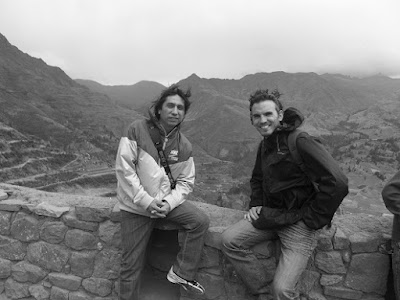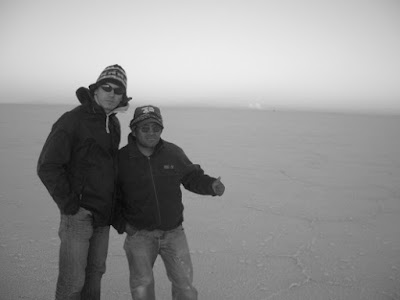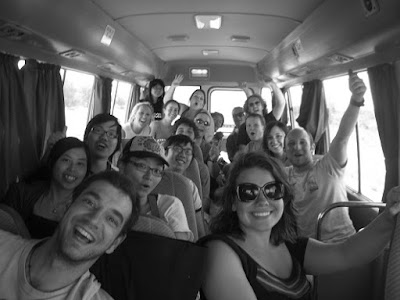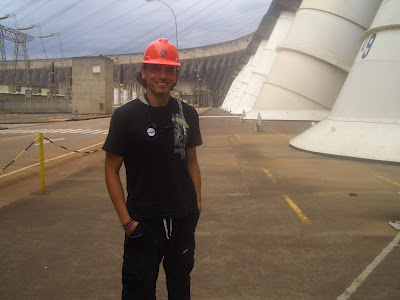
I arrived by bus to the region of the Mato Grosso do Sul and to the city of Campo Grande that was approximately 8.30am. I was terribly tired because I didn’t manage to sleep not even for 1 single minute. The bus, despite the fact that was exactly the same to all those that I have taken so far, seemed particularly uncomfortable. Once at the bus station, the guy of the company which will take me to the jungle was there waiting for me. After 15 minutes of crazy ride, I reached the hostel. I had approximately 2 hours to have a decent breakfast, wash myself as much as I could using the bathroom and drop few emails to advice that I would have been unreachable for the next few days. I jumped on an uncomfortable van together with other few people that as I guessed correctly were about to spend those days with me in the camp. One Swiss couple, an English and a Dutch girls and myself. It took us 3 hours before reaching the border of the jungle. Actually, it is not a proper jungle as its geographically close cousin in the Amazon, but rather more a proper mix of jungle and wet land, with less dense vegetation, which allow you to spot and identify animals much better than in the region of the Amazon. In the Amazon in fact the vegetation is so dense and intense that the light is not able to reach the ground forcing the majority of the animals to live and move almost on top of the trees.

A jeep was waiting for us at the entrance of a restricted area. I realized that the real restricted area wasn’t the one we were about to go into, but the one we were leaving, since the immensity of the jungle out there was predominant compared to the so called civilized or semi industrialized area we were just about to leave. We reached after one hour driving our camp. The camp was very basic divided in dormitory areas each one of them marked by a number and totally covered by mosquito nets. I was assigned on the Dormitory 1, a semi concrete building with 8 hammocks. In the camp there were 4 showers with one with mild water, mostly rain water, 4 toilets, a kitchen and a little canteen. The level of humidity and the amount of insects made me feel constantly wet and sweaty and also very incline to use a good amount of mosquito repellent. The combination of the two things, made my skin constantly dirty and sticky making the showers totally useless. As a consequence of this, I practically almost didn’t shower for 3 long days. Well, what can I say... a little bit of dirty adventure was what I needed I guess.
The amount of animals that I have seen in their habitat was huge. Jaguars, monkeys, caymans, piranhas, birds, tapirs, etc. The best living museum I have ever seen in my life.
The animals were the main actors in a much wider stage. The power of nature was breathtaking. Its dominance, its majesty and its perfection are a mystery that makes me feel very small compared to the universal equilibrium of everything that was surrounding me. Thousands of animals living in perfect balance with their environment, each one of them finding their own little space of living in this immense land, being at the same time prey and predator. I was witnessing the perfection of nature. I was there, feeling as a little point of an infinite line of the cycle of life and death, with all the five elements balancing themselves out in a constant and perennial circle.

The main threat for the animals is obviously coming from humans. Direct killings and destruction of natural habitat are the main reasons. The government of Mato Grosso and Mato Grosso do Sul have found an interesting solution. Basically, if farmers show pictures of their cattle being killed by wild animals, they will be refunded directly by the government with an amount of money which corresponds to the market value of the killed animal. This way, the farmers will not hunt and kill endangered species like for example the jaguars. At the same time, the government has mapped the situation of the land and forest and will constantly keep under control the amount of green areas. If some parts of green area are missing, the government force the farmers to pay a fee and if they are not able to pay, it expropriates the land. These drastic actions are undertaken also (and I would say mostly) to preserve the environment because tourism is becoming the main source of income of the local population and one of the main entrance in the Government balance sheet. At the end, no matter what the reason is, the most important thing remains the effect of these policies which are preserving the environment.
I spent three days in this place. Three days that felt so long and so short at the same time. Living in constant contact with the nature around me, falling asleep with the ‘music’ of the animals and waking up with the first rays of light breathing the humid scent of the trees and rivers. I will never forget this experience. I left the camp with a deeper consideration of how beautiful and fragile nature is. It is up to us to preserve it and to make it flourish at its best. It is a treasure that belongs to all of us and to our future generations. Our own existence depends on that.
TWIMO





























